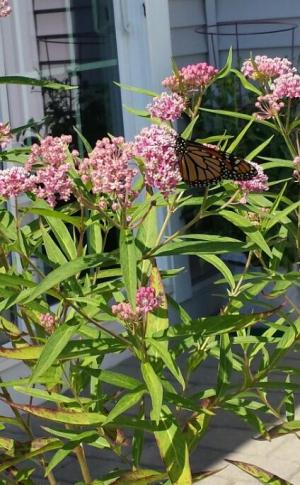For the past four years, my neighbor Marianne has been raising monarch butterflies inside her home. The eggs are almost invisible white dots on the leaves of her milkweed plants. She removes the smaller leaves and places them on damp paper towels. Seven to 10 days later, the dots become hungry caterpillars.
“Once they become caterpillars, my daily chore is cleaning the cage every day, because 30 caterpillars can eat and create a mess,” she said.
She and her husband Bob enjoy watching the metamorphosis to chrysalis. Soon the orange-winged monarchs are released out their back patio door. Seventy-five were set free last year.
Why is she raising monarchs? Because it’s easier than raising chickens. Seriously, though, we need these pollinators to sustain our farms, and monarch butterflies are in trouble, says the Delaware Nature Society website.
“Their numbers have been declining in the last several years over much of their North American range. ... They need habitat – flowers and milkweed – across their migration path, including here in Delaware.”
The organization Monarchwatch.org explains one reason for the decline. “Three times (2002, 2004, 2010) in the last decade, massive Pacific weather systems have moved into central Mexico in January and February. Each of these events resulted in heavy rain, often accompanied by hail, high winds, or freezing temperatures that devastated the monarch overwintering populations.”
Lots of pastimes are available to this couple including delivering Meals on Wheels, but Marianne’s interest in monarchs was piqued in Michigan when her sister-in-law Connie revealed 10 acres of wildlife area where fields were aflutter. Why not experiment with a small backyard in Delaware?
Sue, one of her neighbor gardeners, helps supply her with the necessary milkweed. “We wanted our yard to contain native plants and be a haven for pollinators, like bees and butterflies,” said Sue. “The first year we planted swamp milkweed and had all sorts of caterpillars and butterflies. We are happy to do our part by providing Marianne a plentiful food source for her babies.”
In my research about monarchs, I found another article in the Cape Gazette (July 27, 2017) about Michael McFarlin, an Army colonel from Milton who is on the same mission as Marianne.
In 2017, Maddy Lauria wrote, “McFarlin has spent the last six years raising and releasing wild monarch caterpillars and butterflies to give local populations a leg up. McFarlin estimates the insects he collects have a 95 percent survival rate, compared to the 5 percent survival rate of those fending for themselves in the wild.”
What McFarlin discovered was that “development, excessive mowing and the desire to have perfectly manicured lawns were ridding natural habitats of milkweed, which is monarch caterpillars' sole food source.”
McFarlin is working with the Delaware Department of Transportation through the Enhancing Delaware Highways program to set aside some pollinator-friendly roadside spaces.
Go to www.growmilkweedplants.com/Delaware to find out about adding a purple perennial host plant to your garden.
Almost everyone has a hobby. Maybe you began a new career? What does your senior yearbook reveal about you?






















































